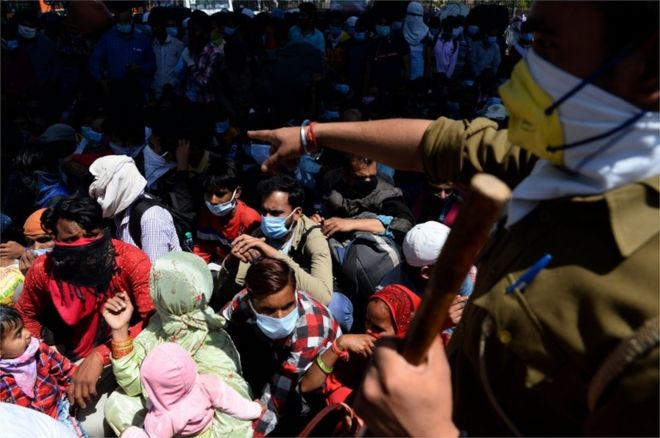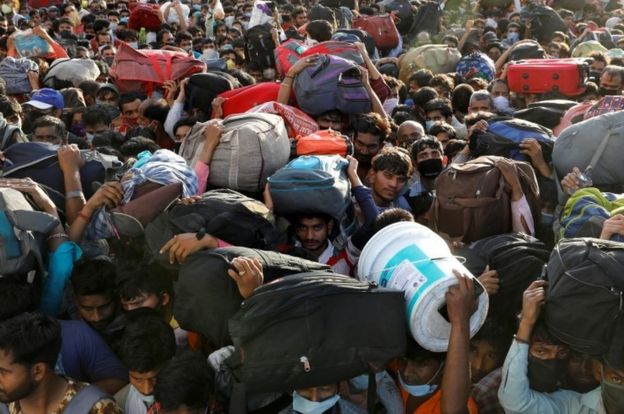India's prime minister has asked for his country's forgiveness after imposing a sweeping lockdown that he said had hurt millions of poor people.
Criticism has mounted over the lack of planning ahead of the coronavirus shutdown, which was introduced with less than four hours' notice.
Many of India's 1.3 billion citizens have been left jobless and hungry.
Tens of thousands of migrant labourers have been forced to walk hundreds of kilometres to their native villages.

In his weekly radio address PM Narendra Modi apologised for the impact of the strict stay-at-home measures.
But he said there was "no other way" to stop the rapid spread of the virus.
"Especially when I look at my poor brothers and sisters, I definitely feel that they must be thinking, what kind of prime minister is this who has placed us in this difficulty?
"I especially seek their forgiveness," he said.
"Possibly many would be angry at me for being locked in their homes.
"I understand your troubles but there was no other way to wage war against coronavirus... It is a battle of life and death and we have to win it."

India announced a $22bn (£19bn) bailout for the country's poor on Tuesday, including free food and cash handouts, but there are concerns this might not reach those most in need.
In an opinion piece published on Sunday, Abhijit Banerjee and Esther Duflo - two of the three winners of the Nobel Prize in Economics in 2019 - said even more aid for the poor was needed.
"Without that, the demand crisis will snowball into an economic avalanche, and people will have no choice but to defy orders," they wrote in the Indian Express.
India has reported about 1,000 cases of coronavirus and 25 deaths.
However, experts worry that the real number of infections could be far higher. India has one of the lowest testing rates in the world, although efforts are underway to ramp up capacity.
There are fears that an outbreak in the country - one of the world's most densely populated - could result in a catastrophe.
The country's economy was already in the midst of a severe slowdown before the country went into lockdown.
Latest Stories
-
SHS heads demand payment of outstanding funds before reopening of schools
35 minutes -
We thank God for the 2024 general elections – Akufo-Addo
49 minutes -
Coconut Grove Beach Resort marks 30 years of excellence with memorable 9 lessons & carols service
1 hour -
WAFU B U-17 Girls’ Cup: Black Maidens beat Nigeria on penalties to win inaugral tournament
2 hours -
Real Madrid beat Sevilla to keep pressure on leaders Atletico
3 hours -
Liverpool put six past Spurs to go four points clear
3 hours -
Manchester United lose 3-0 at home to Bournemouth yet again
3 hours -
CHAN 2024Q: ‘It’s still an open game’ – Didi on Ghana’s draw with Nigeria
3 hours -
CHAN 2024Q: Ghana’s Black Galaxies held by Nigeria in first-leg tie
4 hours -
Dr Nduom hopeful defunct GN bank will be restored under Mahama administration
5 hours -
Bridget Bonnie celebrates NDC Victory, champions hope for women and youth
5 hours -
Shamima Muslim urges youth to lead Ghana’s renewal at 18Plus4NDC anniversary
6 hours -
Akufo-Addo condemns post-election violence, blames NDC
6 hours -
DAMC, Free Food Company, to distribute 10,000 packs of food to street kids
7 hours -
Kwame Boafo Akuffo: Court ruling on re-collation flawed
7 hours

